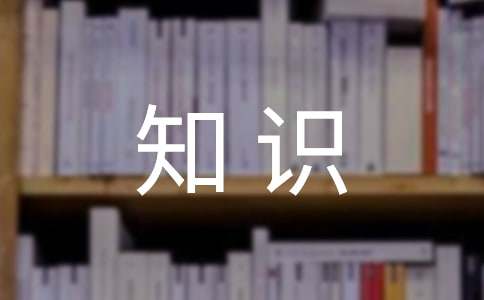- 中考必考英语知识点 推荐度:
- 相关推荐
2023中考英语必考知识点
在平日的学习中,说起知识点,应该没有人不熟悉吧?知识点也不一定都是文字,数学的知识点除了定义,同样重要的公式也可以理解为知识点。掌握知识点是我们提高成绩的关键!下面是小编收集整理的2023中考英语必考知识点,欢迎阅读,希望大家能够喜欢。

名词分类
按概数的功能分类
1. 限定可数名词的概数:
many, a good/great many, many a, (not/quite) a few, few, several, a couple of, dozens of, scores of, a score of, hundreds/thousands/millions…of, a (great/large) number of, numbers of, a group of, a team of, one out of/in ten, a pack of (一群)
Many hands make light work.
众人拾柴火焰高。
A great many guests were invited to dinner.
大批客人受邀就餐。
Many a ship has been wrecked on the rocks.
不少船只撞在岩石上失事。
My friend speaks several languages.
我朋友会讲好几种语言。
There are a couple of vacant rooms behind the office.
办公室后有两三间空房。
He planned to buy dozens of reference books.
他打算买几本参考书。
I’d escaped death a score of times by a hair’s breadth.
我多次死里逃生。
I’ve been there scores of times.
我多次到过那里。
I have a number of things that I must see to.
我有很多事要处理。
Numbers of people came to the meeting from all over the country.
来自全国的许多人士出席了本次会议。
A group of children were playing tag.
一群孩子正在拔河。
Few words are best.
少言最妙。
Three are too many to keep a secret and too few to be merry.
人多难守密,人少不成欢。
Not a few readers wrote letters of commendation to the magazine.
相当多的读者给杂志社写表扬信。
There are quite a few students absent from class today.
今天有不少学生缺课。
In some parts of Britain, one person in ten, by the age of thirty, has no teeth left.
英国有些地方十分之一的人年方三十,牙齿就脱光了。
A multitude of people assembled in the stadium.
大批观众聚集在运动场。
They’re just a pack of liars.
他们不过是一群骗子而已。
2. 限定不可数名词的概数:
a little, little, much, a bit of, a good/great deal of, a large/great amount of, amounts of
I like the country, but I have little opportunity of seeing it.
我喜爱这个国家,但少有机会观光。
A little knowledge is a dangerous thing.
缺乏知识是一件危险的事。
The English do not drink much wine.
英国人饮酒不多。
Let’s have a bit of music.
让咱们来点音乐。
He has given me a great deal of help.
他已给我不少帮助。
A large amount of damage was done in a very short time.
短期内造成了巨大损失。
He must often memorize large amounts of material.
他一定经常记住了不少素材。
3. 限定可数或不可数名词的概数:
some, any, a lot of, lots of, lots and lots of, plenty of, a great/large/vast/quantity of, quantities of, enough, no end of (不少)
Now you can give me some advice.
现在你可以给我提点建议。
Ask some boys to help you.
请些男孩来帮你。
If there is any trouble, let me know.
如果有什么困难要让我知道。
What a lot of time you take to dress!
你在穿戴上花的时间过多。
There are lots of things I can do.
有许多事我能做。
When I was in London I saw lots and lots of her.
我在伦敦常见到她。
She has plenty of imagination.
她的想像力挺丰富。
I have plenty of humorous tales.
我有不少幽默故事。
He collected a quantity of curious information.
他收集了很多稀奇古怪的消息。
We’ve had quantities of rain this summer.
今年夏天雨水充足。
Quantities of food were on the table.
桌上有很多食物。
I had not enough confidence to go ahead.
我没有太大的信心继续下去了。
We have enough seats for everyone.
我们可为大家提供足够的座位。
I’ve warned you no end of times not to touch that machine.
我多次警告你不要碰那台机器。
We had no end of fun at the party.
我们在宴会上很开心。
宾语从句
在句子中起宾语作用的从句叫做宾语从句。学习宾语从句要抓住三要素:引导词、语序和时态。
一、引导词
1.从句为陈述句,常选择引导词that,that引导宾语从句无意义,不充当句子成分常省略。例句:He told us (that) they would help us through the whole work.
2.从句为一般疑问句,常选择引导词if或whether,表示“是否”。在whether…ornot结构中不能用if替换。例句:I dontk now if there will be a bus any more.
3.从句为特殊疑问句,常选择what,when,where,which,who,how等的疑问代词、副词作引导词。例句:He didnt tell m ewhen we should meet again.
二、判断时态情况:
1.主句是一般现在时,从句可以为各种时态。
2.主句是一般过去时,从句要用相应过去时态。
注意:从句描绘客观事实、真理、自然现象等,从句时态不受主句时态限制,仍用一般现在时。
例句:He answered that the was listening to me.
Father told me that practice makes perfect.
三、宾语从句的语序要用陈述句语序
陈述句语序,就是主语在前,谓语动词在后。
错误:He is wondering when can he finish this difficult job.
正确:He is wondering when he can finish this difficult job.
注意:宾语从句的否定转移
主句的谓语动词是think,believe,imagine,suppose,consider,expect,fancy,guess等,并且主句的主语是第一人称而且为一般现在时,从句的否定词一般要转移到主句上来,其反义疑问句一般与宾语从句一致。例如:I dont think he will come to my party.而不能说成 Ithink he wont come to my party.
┃陈述句┃ 陈述句是用于陈述事实和观点的句子。包括肯定结构和否定结构。肯定句变否定句的基本方法如下:
1.be 动词的否定式:在be动词后面加否定词not。如:We arent classmates. 我们不是同学。
2.情态动词的否定式:在情态动词后面直接加否定词not。如: I cant speak English well. 我英语说得不好。
3.实义动词的否定式:借助助动词do/ does构成。一般现在时的句子结构为:主语+doesnt/dont +动词原形+其他。如:He doesnt do exercise every day.他不是每天锻炼。
┃疑问句┃ 疑问句的主要交际功能是提出问题,询问情况。分为一般疑问句、选择疑问句、特殊疑问句和反意疑问句。
1.一般疑问句:通常用来询问一件事情是否属实。答句通常是“Yes”或“No”。如: ―Are you tired? ―Yes, I am.“你累吗?”“是的,我累。”
2.选择疑问句:指提出两个或两个以上可能的答案供对方选择。如: Shall we go home or stay here for the night? 我们回家还是待在这里过夜?
3.特殊疑问句:以疑问词开头,对句中某一成分提问的句子叫特殊疑问句。如: What do you like most? 你最喜欢什么?
4.反意疑问句:反意疑问句又叫附加疑问句,由两部分组成,前一部分是对事物的陈述 即陈述句 ,后一部分是简短的提问 即简短疑问句 ,中间用逗号隔开。要遵循“前否后肯”、“前肯后否”的原则,且两部分的人称和时态要一致。
(1)陈述部分为Let us?时,问句部分习惯上用“will you?”; 陈述部分为Let‘s?时,问句部分习惯上用“shall we?”如: Let us go to the cinema, will you? Let’s go to the cinema, shall we?
(2)陈述部分为“There Here + be + 主语”时,问句部分用“动词+there here ?”形式。如: There are two cakes on the plate, arent there?
(3) 反意疑问句的陈述部分带有little, few, never, hardly, seldom等否定意义的词时,问句部分用肯定式。如: She seldom goes swimming, does she?
(4) 陈述部分的主语为指物的不定代词时,问句部分的主语用it。如: Something is wrong with the computer, isnt it?
(5)陈述部分的主语为指人的不定代词时,问句部分的主语用he或 they,这时问句动词的数应和he或 they一致。如: Someone is knocking at the door, isnt he?
(6) 反意疑问句的陈述部分为“I We don‘t think believe, suppose, consider + that从句”时,问句部分的动词和主语仍与that从句保持一致且用肯定式。如: I dont think that he has finished the work on time, has he?
(7)反意疑问句的陈述部分含有由un-, im-, in-, dis-等否定意义的前缀构成的词语时,陈述部分要视为肯定含义,问句部分用否定形式。如:It is unfair, isnt it?
(8) 陈述部分为肯定的祈使句时,反意疑问句部分可用will you/ wont you; 陈述部分为否定的祈使句时,反意疑问句部分只能用will you。 如: Dont make any noise, will you?
┃祈使句┃ 祈使句是表示请求、命令、劝告、祝愿或建议的句子。否定式是直接在动词原形前加dont。
常见的祈使句的基本句型如下:
1.动词原形+其他。 如: Be careful.
2.Do +动词原形 加强语气 。如: Do be careful next time.
3.加please的祈使句 表示更加客气和礼貌 。如: Open the door, please.
┃感叹句┃ 感叹句一般用来表示说话时的喜悦、惊讶等情感。英语感叹句常用what或how引导,句末用感叹号。
1.what引导的感叹句。
(1)What+a/an+形容词+单数可数名词 +主语+谓语 !如:What a difficult question it is!
(2) What+形容词+复数可数名词/不可数名词 +主语+谓语 !如:What useful information!
2.how引导的感叹句。
(1) How+形容词/副词+主语+谓语!如: How kind they are!
(2) How+陈述句 主语+谓语 !如: How time flies!
(3)what引导的感叹句可以和how引导的感叹句互换。如: What a good girl! = How good the girl is!
┃倒装句┃
1.副词位于句首时。here, there, now, then等副词置于句首时,谓语动词常用be, come, go, lie, run。这种倒装的句型结构的主语必须是名词,如果主语是人称代词则不能完全倒装。如: Here he comes. 他来了。
2.only在句首强调状语。如: Only then did he realize that he was wrong.到那时他才意识到他错了。
3.以so/neither/nor开头的句子。 此句型说明前面的内容也适用于后者,用倒装句“so/neither/nor+be/助动词/情态动词+主语”。如: John cant swim, neither can I.
【中考英语必考知识点】相关文章:
2017中考必考英语知识点大全06-30
2017中考英语必考知识点「名词」09-19
小升初英语必考知识点精选11-05
中考必考化学知识点2017最新10-09
中考物理复习冲刺必考知识点07-31
小学英语必考知识点归纳09-02
2016中考化学的必考知识点10-23
2017中考化学必考知识点08-21
2017北京中考化学必考知识点汇总09-01